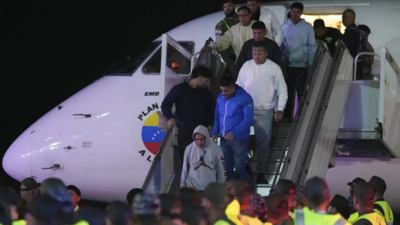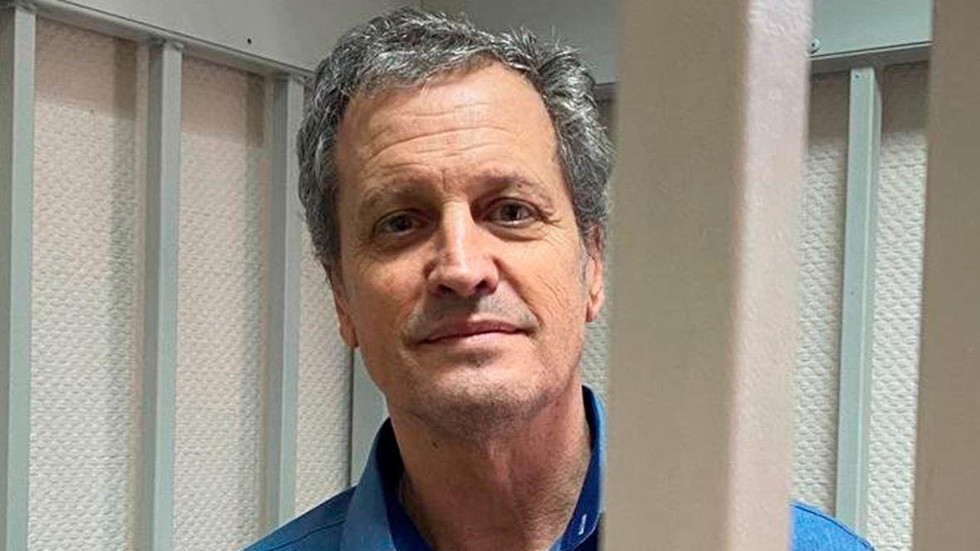
Venezuelan migrants deported from the United States arrive at Simon Bolivar International Airport in Maiquetia (Image credits: AP)
MAIQUETIA: Venezuela has brought home nearly 200
undocumented migrants
from the United States, even as the UN warned there should be no forced returns to the troubled Caribbean country.
Caracas sent two planes which returned home late Monday, saying it hoped for a "new beginning" in ties with Washington, which does not recognize
Nicolas Maduro
as the country's legitimate president.
But in Geneva, the
UN refugee agency
(
UNHCR
) insisted that "people (under) international protection should not be returned, and there should be no forced returns to Venezuela."
US President Donald Trump has pledged to carry out the largest deportation campaign in his country's history, vowing to expel millions of undocumented immigrants, many from Latin American nations.
Shortly after taking office on January 20, he stripped roughly 600,000 Venezuelans in the United States of protection from deportation issued under his predecessor Joe Biden, a measure afforded foreigners who cannot safely return home because of war, natural disasters or other "extraordinary" circumstances.
UNHCR spokesman William Spindler said Monday the situation in Venezuela had not changed, "and in fact, some of the political instability in the country has increased following the recent elections."
Maduro, keen for an end to crippling US sanctions, agreed with visiting US envoy Richard Grenell on January 31 to accept the return of deported migrants and also offered to provide the transport.
Maduro's claim of victory in elections last July has been rejected by the United States and numerous other countries, many of which recognize opposition candidate Edmundo Gonzalez Urrutia as the rightful victor.
The contested election results sparked protests in which at least 2,400 people were arrested, with 28 killed and about 200 wounded in the unrest.
'Dignity and human rights'
The first two Venezuelan flights, chartered by state carrier Conviasa, arrived late Monday at Maiquetia international airport, which serves the capital Caracas.
Some of the migrants had handcuffs that were removed before they disembarked, with some raising their arms in celebration as they descended, an AFP reporter witnessed.
"Venezuela has always made it clear that any transfer of Venezuelans must be done with absolute respect for their dignity and human rights," a foreign ministry statement said.
It also stated the Venezuelan government's hope for "a new beginning of relations between the two countries, based on respect."
Caracas broke off ties with Washington in January 2019 after Trump recognized then-opposition leader Juan Guaido as "interim president" following 2018 elections that were widely rejected as neither free nor fair.
Maduro maintained and tightened his hold on power despite international pressure, and was sworn in to a third six-year term last month.
The Biden administration had relaxed sanctions on Venezuelan oil as part of a deal for US prisoners and a promise to hold free elections.
Venezuela freed 10 US citizens in a swap, but Biden reimposed penalties after Maduro did not follow through on democratic reforms.
There was a concession, however, that allowed companies such as Chevron to continue operating in Venezuela, which has the world's largest proven oil reserves.
Grenell had traveled to Caracas to meet Maduro despite Washington's objections to his regime, and returned home with six Americans who had been detained there.
It was not clear what Caracas gained from the talks, which Mauricio Claver-Carone, US special envoy for Latin America, has said did not imply any softening of the US position on Maduro.
The Trump administration has said "we don't need Venezuelan oil."
The White House posted a photo on social network X Monday of cuffed and shackled people boarding a Conviasa plane, stating: "Repatriation flights to Venezuela have resumed, with Ambassador @RichardGrenell overseeing the first two flights. MAKE AMERICA SAFE AGAIN."
During his election campaign, Trump repeatedly highlighted suspected crimes by undocumented migrants, although immigrants are statistically less likely to commit crimes than native-born Americans.
Some of the deported Venezuelans had suspected ties to the Tren de Aragua gang, officials said, although Venezuelan interior minister Diosdado Cabello said "very few" had criminal records.
All passengers would undergo a criminal record check, with those arrested for immigration violations in the United States released while the alleged criminals would be put behind bars for investigation, according to an interior ministry official.

 4 hours ago
3
4 hours ago
3







